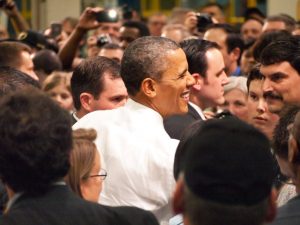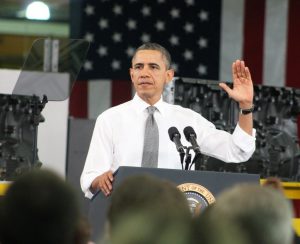by Jackie Starkey – News Editor – [email protected]

Following his State of the Union address, President Barack Obama visited Asheville last Wednesday to reiterate plans to raise the minimum wage and make manufacturing a priority in western North Carolina and beyond.
“Our job as Americans is to restore the basic bargain that says if you work hard, if you are willing to meet your responsibilities, you can get ahead,” Obama said in his address at Linamar manufacturing plant.
The president’s visit fell a day after he announced his plans to see the minimum wage increased nationally to $9, up from North Carolina’s $7.25, which is on par with the national average according to the U.S. Department of Labor.
“That’s what we should be focused on,” Obama said on Wednesday. “How do we make sure that people who are willing to work hard can make a decent living and look after their family?”
Obama said the effort to provide for middle class families and improve the nation’s economy starts with the aggregation of home-grown industry.
“There are three things we should be asking. Number one – how do we bring more jobs to America? Number two – how do we equip people with the skills they need to do those jobs? And number three – how do we make sure that once they have a job, it leads to a decent living?” Obama said.
The president said while corporate America experiences great financial growth, an increase in the minimum wage would lessen the socio-economic divide and provide some relief to ensure provision for the middle class.
“I believe we reward effort and determination with wages that allow working families to raise their kids and get ahead,” Obama said. “It’s time for an increase in the minimum wage, because if you work full-time, you shouldn’t be in poverty.”
The president proposed to enact the wage increase by 2015, providing a better minimum income for more than 15 million Americans, according to the Obama Administration.
Republicans previously opposed minimum wage reform on the basis that companies will no longer seek to hire candidates with lower skill sets or less educational experience. Obama first proposed a minimum wage increase in 2008, hoping to see workers making $9.50 an hour by 2011.
Obama said better opportunities for American laborers will be a top priority in Washington, D.C., for the duration of his presidency.
“The true engine of America’s economic growth has always been its middle class,” Obama said. “Our middle class when it’s growing, when it’s thriving, when there are ladders of opportunity for people to do a little bit better each year and then make sure their kids are doing even better than them, that’s the American dream.”
Despite noting economic growth in the automotive and housing industries during his State of the Union address on Feb. 12, Obama said the American economy must make moves to bring manufacturing back to the states a priority in the coming years.
“I believe we attract new jobs to America by investing in new sources of energy and new infrastructure and the next generation of high-wage, high-tech American manufacturing. I believe in manufacturing. I think it makes our country stronger,” Obama told Linamar employees.
The president praised both Linamar and Asheville for an effort to renew manufacturing processes that once provided jobs for thousands in western North Carolina.
Volvo, who previously manufactured in the area, vacated their plant in 2008, taking 228 jobs with them.
“That was a big blow for this area,” Obama said.
The president praised local officials for reaching out to companies with incentives to rebuild the manufacturing industry in this part of the state, an action he said needs to spread nationwide.
In 2011, Linamar Corporation, a Canadian-based engine parts manufacturer, announced a plan to invest $125 million in a new Asheville plant and create 400 jobs by 2020.
“While they could have gone any place in the world, they saw this incredible potential right here in Asheville,” Obama said. “They saw the most promise in this workforce, so they chose to invest in Asheville, in North Carolina, in the United States of America.”

According to the president, the Asheville Linamar plant has already provided 160 jobs to Asheville-area residents, and has plans to increase that number to 200 by the year’s end.
Some of those jobs were filled by those laid off by Volvo and other manufacturers who left the area, including Stratton Tatum, former Volvo employee and current quality technician for Linamar. Tatum, who introduced the president Wednesday, said the president’s visit bodes well for the plant and Asheville as a whole.
“It’s great,” Tatum said. “It’s not only great for Linamar, but for this area. Anytime a President of the United States comes to this area, it’s a big deal. Anytime he pushes manufacturing it’s great.”
Tatum said he hopes the publicity the president’s visit provided for Linamar will strengthen the financial future of manufacturing to this state.
The president said the expense of leaving industry jobs overseas has become too great and the country must focus on renewing business that is both sustainable and rewarding.
“America is getting more competitive and more productive,” Obama said. “(Manufacturers are) bringing back jobs from Japan. Ford is bringing jobs back from Mexico. After placing plants in other countries like China, Intel is opening its most advanced plant here in the United States. Apple is starting to make Macs in America again.”
The president cited 500,000 new jobs created by American manufacturers in the last 3 years, a success spawned by government incentives and need for reduced costs of goods transportation.
Ronnie Riddle, a machinist for Linamar, said the creation of jobs in Asheville means more opportunities for families like his own.
“When the economy went bad a couple of years ago, a lot of people lost their jobs,” Riddle said. “It’s nice to be back in this business now.”
Riddle, who has a machinist background, as well a two-year degree in business, lost his factory job a few years ago and turned to construction to make ends meet. His wife Tonya Riddle said the opening of the Linamar plant provided an excellent opportunity for their family and families in similar situations.
“It’s been a blessing because the construction industry tanked and those jobs went away,” Tonya Riddle said. “Since Linamar, we’ve been able to feed our family and go on vacation.”
Shaun Coughlin, senior new media student at UNC Asheville, agreed and said the president addressed powerful concerns in the Asheville community.
“I really liked what he had to say about jobs,” Coughlin said. “My father was laid off at Arvado Digital Services in Weaverville.”
Ronnie Riddle said the need for manufacturing seems more prevalent in this part of the state, where a majority of jobs used to be in manufacturing and factory-related labor.
The president said he hopes stories of success, like that of Linamar, encourages other businesses to areas previously reliant on manufacturing, as well as sustainable industry initiative in parts of the country that need to experience growth.
As of 2011, non-manufacturing companies in Buncombe County, such as Ingles, the Biltmore Company and Mission Health and Hospitals, provided more jobs than industry manufacturers to this area.
Obama said new partnerships with schools like Asheville-Buncombe Technical Community College could provide more properly skilled workers to fill manufacturing jobs and mark industry success for Buncombe and the surrounding counties.

“No job in America should go unfilled because somebody doesn’t have the right skills to get that job,” Obama said.
Currently, the UNC system is evaluating a plan that could generalize educational requirements at the collegiate level across the state. The plan is receiving heavy criticism at institutions such as UNCA, which provide a core curriculum based in the liberal arts and critical thinking, rather than job-oriented, skill-based training.
However, Riddle agreed with the president, saying partnerships with technical institutions like A-B Tech provide means to better skilled laborers and encourage insourcing and innovation in the states.
While the president reported growth in American industry, he noted the process will take negotiation on the part of both political parties.
“This is a job for everybody. This is not a Democratic thing or a Republican thing,” Obama said.
Additionally, increases to manufacturing will take time and patience on behalf of the middle class, according to Obama.
“Now, I’m going to be honest with you. We’re not going to bring back every job that has been lost to outsourcing and automation over the last decade,” the president said. “(Manufacturing) has changed. That means you can just produce a lot more with fewer people.”
However, economic growth and reform of wage policies are top priority for himself and Congress, the president said.
“We don’t give up. We get up. We innovate. We adapt. We learn new skills. We keep going,” Obama said. “I just want everybody here to know at this plant, everybody in Asheville, everybody in North Carolina and everybody all across the country – I want you to know as long as you’re out here fighting everyday to better your lives, better the lives of your children, then I’ll be back in Washington fighting for you.”

















